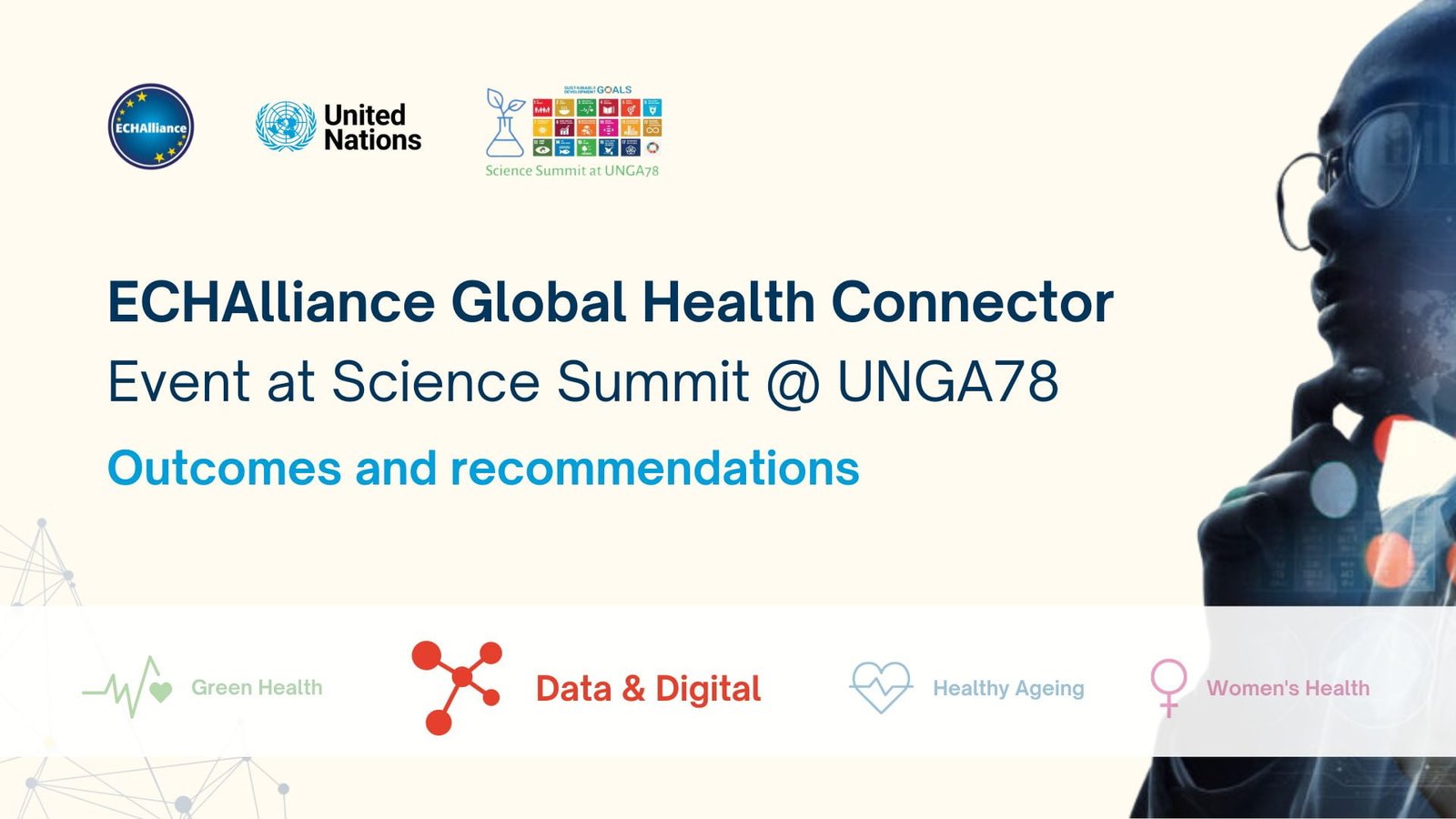The ECHAlliance Global Health Connector Event at UN Science Summit underscored the pivotal role of data in advancing public health.
Data was the link to:
- Inform and develop public health.
- Drive screening programmes.
- Move from disease to prevent and wellbeing
- And; evidence to transform services and outcomes.
At the event we hear from:
- Ya-Ting Chen – Executive Director of Vaccines at MSD’s Center for Observational and Real-World Evidence
- Rear Admiral Aisha K Mix – Assistant Surgeon General, Chief Nurse US Public Health Service
- Dr Marius Geantă – Chair of Policy and Innovation Advisory Committee at FH Europe Foundation
- Dr Santiago Miriuka – Co-Founder & CEO MultiplAI
- Professor Joseph Kvedar – Professor of Dermatology at Harvard Medical School, Senior Advisor at Massachusetts General Hospital Centre for Innovation in Digital Healthcare, Editor-in-Chief at npj Digital Medicine
- Oleskill Iaremenko – Health Recovery Office Ministry of Health Ukraine
- Professor Dipak Kalra – President European Institute for Innovation Thr~ugh Health Data
- Professor Rachel Dunscombe Professor at Imperial College, UK Government AI Council Member & Co-Chair OpenEHR & Director the Digital Health Society
In continuation of our efforts following the Global Health Connector event, we are excited to present a concise yet vital set of data recommendations. These recommendations align closely with the United Nations Summit of the Future’s objective of harnessing digital technology to drive human progress while minimising potential harm.
These data-focused recommendations are a testament to our mission to reshape the landscape of healthcare and public health through the power of information. They provide a glimpse into the transformative potential of data in advancing well-being on a global scale.
Recommendations in the area of Data & Digital
- Global Code for Cardiovascular Health: We recommend starting the work on the development of a global code for cardiovascular health at the Summit of the Future. This code should outline best practices, guidelines, and strategies to combat cardiovascular diseases on a worldwide scale. By uniting nations under a common framework, we can address this leading cause of death and promote cardiovascular health globally.
- International Standards for Digital Health Products: We propose the creation of a United Nations-led international plan for assessing the quality, safety, and efficacy of digital health products and services. This plan should establish global standards and certification processes to ensure that digital health innovations meet high-quality standards, protect patient data, and enhance healthcare delivery worldwide.
- Multi-Sector Collaboration for Healthcare: Recognizing that no single organisation, sector, or country can solve global healthcare challenges alone, we urge industry leaders, policymakers, healthcare professionals, providers, NGOs, and the voluntary sector to enhance collaboration. The Summit of the Future should serve as a platform for fostering innovative partnerships, sharing best practices, and collectively addressing healthcare issues.
- Maximising the Role of Nurses: Acknowledging the significant role nurses play in healthcare systems, we recommend discussions at the Summit of the Future to explore practical ways to maximise the role and voices of nurses. This includes empowering nurses to take on expanded responsibilities, especially in underserved communities, to address the shortage of doctors and improve healthcare access.
- Data Collection for Underserved Communities: To bridge the gap in healthcare data for underserved communities, we advocate for immediate action to collect missing data. The Summit should prioritise initiatives that focus on gathering comprehensive health data from marginalised populations. This data can then inform targeted interventions and policies to reduce health disparities.
Additionally, we emphasise the importance of a global campaign to boost health and digital literacy, targeting all stakeholders including citizens, patients, healthcare professionals, policymakers, and healthcare administrators. This campaign should include the development of toolkits, guidelines, and best practices to ensure that new technologies like AI are harnessed effectively for treatment, prevention, and overall well-being, benefiting all communities worldwide.
If you want to continue hearing about data & digital you can’t miss our Digital Health Society Summit on November 14-15.
The two-day Virtual Summit highlights the most current thought leadership from the Digital Health Society (ECHAlliance’s data arm), presenting innovation, research, European funded projects, and addressing the latest digital and data challenges in the context of digital health.

